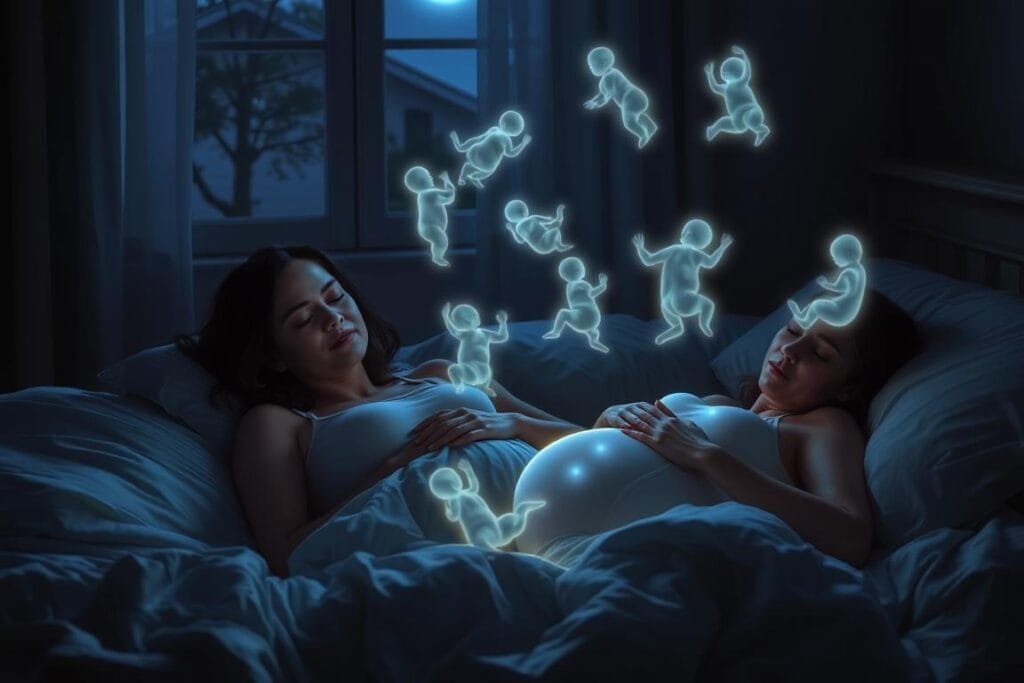Have you ever woken up from a vivid experience where you were giving birth, even though you’re not expecting? Such occurrences can be both confusing and intriguing. They often leave people wondering about their deeper significance.
According to a 2014 study, pregnant individuals tend to have more nightmares, which could be linked to stress or hormonal changes. But what about those who aren’t pregnant? Experts suggest these experiences might symbolize new beginnings or emotional growth.
Lauri Loewenberg, a renowned dream analyst, explains that these scenarios often represent personal transformation. From an evolutionary perspective, they may help process stress or prepare for future challenges. Biologically, REM sleep plays a role in bonding, which could explain why such themes emerge.
So, what does it mean when you dream of giving birth without being pregnant? This article explores psychological, symbolic, and biological interpretations to help you uncover the meaning behind these unique experiences.
The Symbolism Behind Dreams of Giving Birth
What does it mean to dream about bringing new life into the world? These experiences often symbolize transformation, growth, and the start of something meaningful. Whether you’re expecting or not, such dreams can reflect internal changes or emotional shifts.
New Beginnings and Personal Growth
Dreams about childbirth are frequently linked to new beginnings. They may represent the birth of a new idea, a project, or even a fresh phase in your life. Lauri Loewenberg, a dream analyst, compares these experiences to starting a degree or launching a startup—both require nurturing and patience.
A 2001 study found that pregnant individuals dream more about childbirth, but non-pregnant people also experience these dreams. For them, it often symbolizes personal growth or the development of new skills. For example, a coworker’s dream about pregnancy reflected their readiness to take on more responsibilities at work.
Nurturing Instincts and Emotional Needs
These dreams can also highlight your nurturing instincts. Caring for a baby in a dream might mirror your desire to care for others in waking life. A 2007 REM sleep study suggests that such dreams are tied to maternal bonding, even if you’re not a parent.
For career-focused individuals, dreaming about someone else’s baby could symbolize taking charge of a project or mentoring a colleague. On the flip side, nightmares about losing a baby might reflect fears of failure or unmet goals.
Ultimately, these dreams encourage you to explore your emotional needs and relationships. They remind you to nurture your mental health and embrace life’s transitions with confidence.
Psychological Perspectives on Pregnancy Dreams
Exploring the psychological layers of pregnancy-related dreams can reveal deeper truths about the mind. These experiences often reflect inner fears, desires, and personal growth. By examining theories from Freud, Jung, and modern cognitive science, we can better understand their meaning.
Freudian and Jungian Interpretations
Freud viewed dreams as a form of wish fulfillment. He believed that pregnancy-related scenarios symbolized hidden desires or unresolved conflicts. For example, a dream about childbirth might represent a longing for creativity or new beginnings.
Jung, on the other hand, introduced the concept of archetypes in the collective unconscious. He saw these dreams as symbols of personal transformation. An “evil baby” in a dream, for instance, could represent Jung’s shadow archetype—a part of the self that needs acknowledgment and integration.
Modern Cognitive Theories
Modern psychology focuses on how the mind processes emotions and memories during sleep. A 2013 study by Wamsley highlighted the role of REM sleep in memory consolidation. This suggests that pregnancy-related dreams might help process stress or unresolved trauma.
Lauri Loewenberg’s “pressure valve” theory adds that these experiences act as a release for pent-up anxiety. Whether it’s fear of failure or the weight of adult responsibilities, such dreams provide a safe space to confront these emotions.
By combining Freudian, Jungian, and cognitive perspectives, we gain a comprehensive understanding of these vivid experiences. They are not just random scenarios but windows into our inner world.
Common Scenarios in Dreams of Giving Birth When Not Pregnant
Have you ever experienced a vivid scenario where you’re nurturing a newborn, even if you’re not a parent? These dreams can feel surreal, but they often carry deep symbolic meanings. Understanding the common themes can help you decode their significance.
Holding or Caring for a Newborn
One of the most frequent scenarios involves holding or caring for a baby. This can symbolize a desire for responsibility or a new idea in your life. However, it might also reflect feelings of overwhelm or unpreparedness.
For example, a study with 88 participants found that dreams about nurturing a newborn often mirror real-life situations. These could include taking on a new project at work or caring for a loved one. Lauri Loewenberg suggests that such dreams act as a “pressure valve” for emotional stress.
Nightmares About Childbirth or Loss
Not all dreams about childbirth are positive. Nightmares involving loss or complications can be unsettling. These often reflect fears of failure or unmet goals. For instance, dreaming about a lost baby might symbolize career uncertainty or a strained relationship.
Research shows that such nightmares are tied to real-life disappointments. They can also parallel postpartum anxiety, even in non-pregnant individuals. Recognizing these connections can help you address underlying concerns.
| Dream Scenario | Symbolic Meaning |
|---|---|
| Holding a baby | Desire for responsibility or new beginnings |
| Crying baby | Unresolved emotional needs |
| Lost baby | Fear of failure or unmet goals |
| Positive birth | Personal growth or successful transition |
| Traumatic birth | Stress or unresolved trauma |
To better understand these dreams, consider journaling prompts like: “What emotions did I feel during the dream?” or “How does this relate to my waking life?” Contrasting positive and traumatic outcomes can also provide clarity.
Remember, these experiences are not predictions but reflections of your inner world. By exploring their meanings, you can gain valuable insights into your emotions and challenges.
Emotional Triggers for Baby Dreams
Why do certain emotions spark vivid experiences during sleep? These scenarios often reflect what’s happening in your waking life. Stress, anxiety, and major transitions can shape the themes of your nighttime narratives. Understanding these triggers can help you decode their deeper meanings.

Stress and Anxiety Manifestations
High levels of stress or anxiety often translate into symbolic visions. For example, dreaming about a lost baby might mirror fears of failure or unmet goals. Research shows that these scenarios are tied to real-life disappointments or overwhelming responsibilities.
Lauri Loewenberg’s “pressure valve” theory suggests that such experiences act as a release for pent-up emotions. Whether it’s career uncertainty or relationship strain, these dreams provide a safe space to confront your feelings.
- Map major stressors to dream content patterns.
- Relocate anxiety to “lost baby” dream frequency.
- Offer CBT techniques for anxiety reduction.
Life Transitions and Unresolved Goals
Major life changes, like starting a new job or moving to a new city, can activate pregnancy metaphors in your mind. These dreams often symbolize personal growth or the development of new skills. For instance, a promotion might trigger visions of a “premature birth,” reflecting fears of being unprepared.
Perimenopausal women may experience empty nest dreams, symbolizing a shift in their nurturing role. Similarly, hormonal cycles can influence the frequency and intensity of these scenarios.
- Discuss quarter-life crisis dreams in 20-30s demographics.
- Analyze unplanned pregnancy dreams as fear of life disruption.
- Contrast proactive vs. reactive life change dreams.
By exploring these emotional triggers, you can gain valuable insights into your mental health and embrace life’s transitions with confidence.
How Hormones and Biology Influence Dreams
The connection between biology and vivid nighttime experiences is more profound than many realize. Our sleep cycles and hormonal balances play a significant role in shaping these scenarios. Understanding these factors can shed light on why certain themes, like pregnancy, appear in our dreams.
The Role of REM Sleep
REM (Rapid Eye Movement) sleep is a critical phase where most vivid dreams occur. During this stage, the brain processes emotions and memories, often leading to intense or symbolic scenarios. A 2007 study highlighted that REM sleep is closely tied to maternal bonding, even in non-pregnant individuals.
This phase also acts as a “pressure valve” for emotional stress. For example, unresolved anxiety or life transitions can manifest as pregnancy-related themes. By analyzing these patterns, we can better understand the mind’s way of coping with challenges.
Hormonal Fluctuations in Pregnancy-Like Dreams
Hormones like progesterone and melatonin significantly influence dream intensity. Progesterone, in particular, is known to enhance vividness, which is why pregnant women often report more detailed dreams. However, hormonal changes during fertility treatments or menopause can also trigger similar experiences.
Birth control and hormone replacement therapy can alter dream content, sometimes leading to recurring themes. For instance, a drop in estrogen levels might result in nightmares or unsettling scenarios. Understanding these connections can help individuals manage their health and sleep quality.
| Hormonal Profile | Dream Impact |
|---|---|
| High Progesterone | Increased dream vividness |
| Low Estrogen | Nightmares or unsettling dreams |
| Fertility Treatments | Heightened pregnancy-related themes |
| Menopause | Recurring or symbolic dreams |
To improve sleep quality and reduce intense dreams, consider maintaining a consistent sleep schedule. Avoiding caffeine before bed and creating a calming bedtime routine can also help. By addressing these factors, you can gain better control over your nighttime experiences.
When to Pay Attention to Recurring Baby Dreams
Recurring nighttime narratives about babies can signal deeper emotional or psychological concerns. While these experiences are often symbolic, they may also point to unresolved stress or challenges in your waking life. Understanding when to take them seriously can help you address underlying issues effectively.

Signs of Underlying Stress
Frequent dreams about babies might indicate high levels of stress or anxiety. According to Loewenberg, recurring themes often act as a “pressure valve” for emotional tension. If these dreams disrupt your sleep or cause distress, it’s worth exploring their root causes.
- Persistent nightmares about losing a baby.
- Dreams that leave you feeling overwhelmed or exhausted.
- Increased frequency during major life transitions.
- Sleep paralysis episodes linked to birth trauma symbolism.
- Emotional triggers tied to unresolved goals or relationships.
Connections to Waking-Life Challenges
These dreams often mirror real-life situations. For example, a startup founder’s recurring labor dreams reflected their fear of failure in a high-pressure environment. Similarly, financial stress might manifest as “multiple births” in your nighttime narratives.
Dream journaling can help identify patterns. By tracking your emotions and themes, you can gain insights into your health and well-being. The Pittsburgh Sleep Quality Index (PSQI) is a useful tool for assessing sleep disturbances linked to these experiences.
| Dream Theme | Possible Real-Life Connection |
|---|---|
| Lost baby | Fear of failure or unmet goals |
| Multiple births | Financial or career stress |
| Traumatic birth | Unresolved trauma or anxiety |
| Positive birth | Personal growth or successful transition |
If these dreams persist or worsen, consider consulting a sleep specialist. Addressing the root causes can improve your sleep quality and overall health. Remember, these experiences are not predictions but reflections of your inner world.
Navigating Baby Dreams with Clarity
Understanding the meaning behind baby-related dreams can offer valuable insights into your mental health and personal growth. Whether rooted in biology or psychology, these experiences often symbolize transformation or new beginnings. By combining scientific and symbolic approaches, you can decode their messages effectively.
Start by keeping a dream journal to track recurring themes and emotions. Mindfulness practices, like meditation, can help reduce anxiety linked to these vivid experiences. Therapeutic methods, such as CBT or Jungian analysis, provide deeper understanding and coping strategies.
For those seeking clarity, resources like sleep apps and dream dictionaries can be helpful. Remember, these dreams are not predictions but reflections of your inner world. Embrace them as opportunities for self-discovery and growth.
As Lauri Loewenberg says, “Every dream holds the potential for transformation.” By exploring their meaning, you can navigate life’s challenges with greater confidence. For more insights, check out this guide on interpreting baby dreams.







